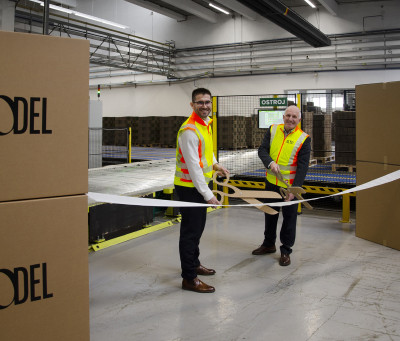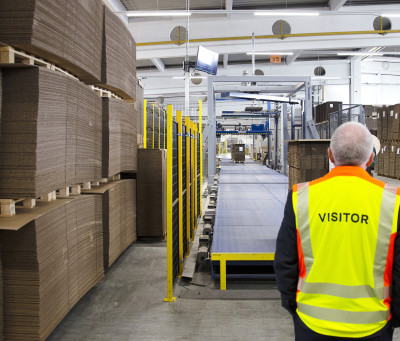The Czech engineering company OSTROJ has completed a modern conveyor system that will significantly increase the efficiency of cardboard packaging production at Model Obaly in Moravské Budějovice. The contract, worth approximately CZK 25 million, included the development and production of an automated conveyor system for transporting products to the packaging line.
The 250-meter-long conveyor system, which includes over 1 kilometer of modular belt, automates the transport of production to the packaging line, replacing handling with forklifts and hand-operated trolleys. A key element is a sophisticated buffering system with a capacity of 135 pallet spaces, controlled by a top-notch software solution. "The conveyor system we developed and designed will better manage production peaks and minimize losses caused by production line overload. We tailored the conveyor to the production process and continuously adjusted it according to customer requirements," said Adam Majewski, OSTROJ's sales manager.
The new system can transport up to 62 pallets per hour, which corresponds to processing 22,000 m² of cardboard packaging per hour. It also allows the transport of atypical and oversized pallets, further expanding the flexibility of the production process. "Automation of transport has helped us significantly increase workplace safety, minimize the risk of collisions, and simplify logistics by reducing the number of forklifts needed," said Josef Chalupný, COO of Model Obaly, and added: "Thanks to the new conveyor system, we have optimized product packaging and improved the efficiency of the entire process, which has resulted in smoother operation and better utilization of the packaging line."
The project also included elements for efficient product handling, such as automated trolleys, transfer cars, and turntables. At the customer's request, additional production machines were connected during installation, and the control system was expanded with new functions. "We tested all the functions of the line and the maximum capacity of transported products by running the production machines at their maximum capacity during the load test," said Martin Cmiel, director of the Mining and Industrial Technology division at OSTROJ.
OSTROJ used modern technologies in the design and implementation of the project, such as Visual Components software for simulating material flows, and virtual reality, which facilitated the presentation of the design and consultations with the customer. Thanks to these digital technologies, it was possible to optimize the entire system and eliminate any shortcomings already in the design and construction phase of the new line. Testing took place under real operating conditions, including simulating the maximum performance of production machines and the newly installed conveyor system. OSTROJ also optimized the environment for easy operation and control, including enabling remote access for operation and servicing of the line.
The project took seven months from contract signing to start-up in January 2025. "We transported the conveyor system to Moravské Budějovice with seven trucks and two smaller vans. The assembly itself took two months and took place during full operation, so the customer had no production downtime," added Martin Cmiel.

